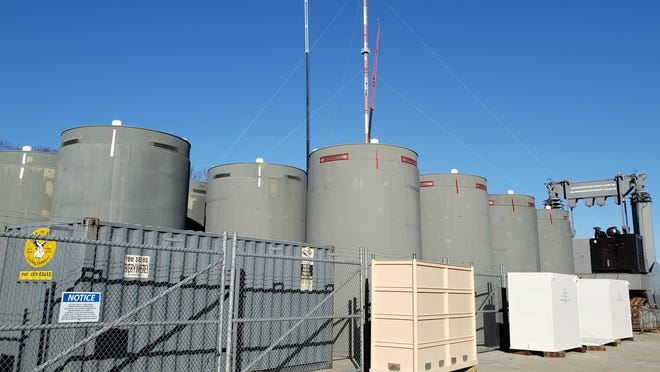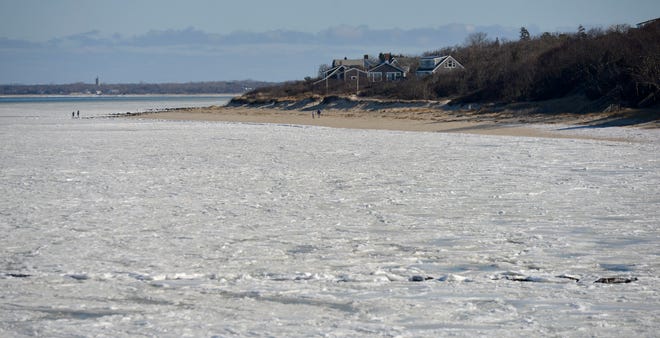PART 1
Cape town leaders oppose radioactive water release in Cape Cod Bay, in letters filed at hearing
Emergency legislation filed iaSarn January subject of April 12 joint judiciary committee hearing

Lawmakers, environmentalists and Cape officials are rallying behind legislation that would permanently put the plug into a plan to dump one million gallons of treated radioactive wastewater from the now-closed Pilgrim Nuclear Power Station into Cape Cod Bay.
The bill was filed in response to a 2021 proposal by Holtec International— the company that bought the Plymouth plant from Entergy Corporation in 2019 to take over its decommissioning — to the Nuclear Regulatory Commission (NRC) to discharge the water.
On Tuesday, the Legislature's Joint Committee on the Judiciary heard testimony on the emergency legislation filed in January by state Sens. Susan Moran, D-Falmouth, and Julian Cyr, D-Truro. Sen. Patrick O’Connor, R-Weymouth, and Reps. Timothy Whelan, R-Brewster, Sarah Peake, D-Provincetown, and Patrick Joseph Kearney, D-Scituate, have since joined as co-sponsors.
The measure would prohibit the discharge of any solid or liquid radioactive material, directly or indirectly, into coastal or inland waters.
Tuesday’s testimony
In support of the bill, lawmakers heard people and groups from across the Cape and the South Shore, including Cape Downwinders, a nuclear watchdog group; Pilgrim Watch, a group focused on providing information and resources regarding the Pilgrim plant’s decommissioning; the Herring Pond Wampanoag and the Massachusetts Lobstermen’s Association.
Much of the testimony centered on fears about the environmental and health safety of the bay’s ecosystem and surrounding communities, the impact on South Shore and Cape real estate as well as the potentially devastating impact on Massachusetts’ fishing and seafood industries.
“This discharge as proposed could impact the commonwealth’s coast, particularly the southeast and Cape,” Moran said. “It will harm the commercial success of the shellfishing industry as well as our tourism economy, while making the coast increasingly vulnerable in the face of challenges relating to climate change.”
Moran said she had submitted written testimony as well, including letters from the select boards of Barnstable, Bourne, Dennis, Duxbury, Eastham, Mashpee, Orleans, Plymouth and Sandwich “strongly opposing" Holtec’s water discharge plan.
There’s also ambiguity as to whether the state can regulate the discharge of the water, she said.
According to Moran, the National Pollutant Discharge Elimination System is the state’s water discharge permit for the plant. While it regulates a number of pollutants, it does not regulate nuclear material.
Holding a water discharge permit from the state, then, could be approval enough even if toxic waste was in the water being discharged. While the NRC oversees radioactive waste, it is unlikely to intervene where the amount of radioactivity falls below federal standards, Moran said.
The bill, according to Moran, eliminates the ambiguity by prohibiting any discharge of radioactive waste into coastal waters, and provides a hefty fine for those who violate it.
“We cannot sit idly by and point fingers at who’s responsible, which permit gives authority,” she said. “We, as legislators, need to take the lead and say no.”
The fight against dumping started early
Protest against the proposal turned to alarm when U.S. Rep. William Keating told the Times that Holtec reported to the NRC not long after it put forth its proposal that it planned to begin discharging radioactive water within the first three months of 2022.

Swift backlash ensued, not just from South Shore and Cape communities but lawmakers as well—U.S. Sens. Edward Markey and Elizabeth Warren, and Keating and U.S. Rep. Seth Moulton, co-signed a letter in January urging Holtec to forgo discharging the nuclear wastewater.
For its part, Holtec, through a spokesman, said the company is committed to not discharging any treated wastewater for the rest of 2022, and is investigating alternatives. The spokesman said he expects by the third or fourth quarter of 2022 the company will announce its decision.
The water is mainly from the spent fuel pool and the reactor vessels, and acted as a place to cool the fuel rods and the insides of the reactors when the plant was in operation.
Known as "overboarding," discharging radioactive water is considered routine practice within the nuclear power industry. The water is filtered to reduce radioactivity to a level acceptable to regulators, and then can be released. It has been used at Pilgrim in the past, plant operators say.
There were objections to Holtec’s takeover of the plant’s decommission. When Entergy was in discussion with Holtec in 2019, some officials, including Keating, objected to the company, citing concerns over the $1.03 billion decommissioning trust being handed to a private company that had never decommissioned a nuclear power plant before.
Massachusetts Attorney General Maura Healey filed two petitions against the sale of the plant to Holtec, one in September 2019 and one in January 2020. By June 2020, however, the parties reached a settlement, which required Holtec to abide by stricter financial and environmental standards than federally recommended.
That settlement is partly why there was a significant outcry when it was reported that Holtec had received approval from the NRC to begin discharging the radioactive water, potentially going against the stringent radiological cleanup requirements outlined in the settlement.
An April 10 protest in Plymouth drew hundreds.
Community testimony on Tuesday
“Holtec claims that they will treat and clean the water but dismisses the reality that a dangerous radioactive nucleotide tritium cannot be separate from the water they prepare to dump,” Diane Turco, director of Cape Downwinders, told lawmakers. “There is no ‘safe’ dose (of radiation) besides zero that would not cause harm.”
Radioactive materials in the water, particularly tritium, will bind with sediments and grasses in the ecosystem and compound as it moves up the food chain, Turco said, resulting in higher and higher concentrations of potentially harmful radiation with consumption of seafood caught in the waters of the bay, she said.

No comments:
Post a Comment
Note: Only a member of this blog may post a comment.